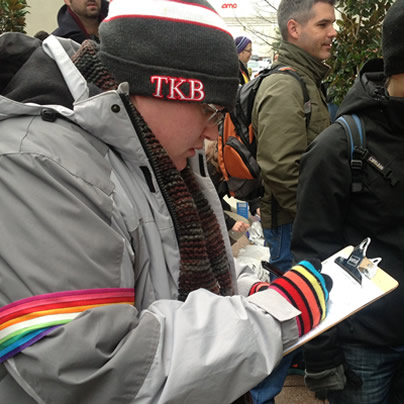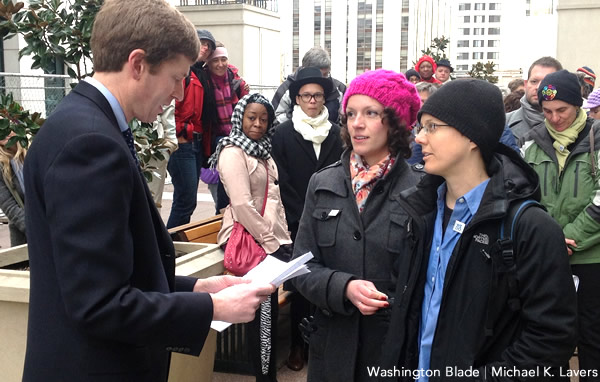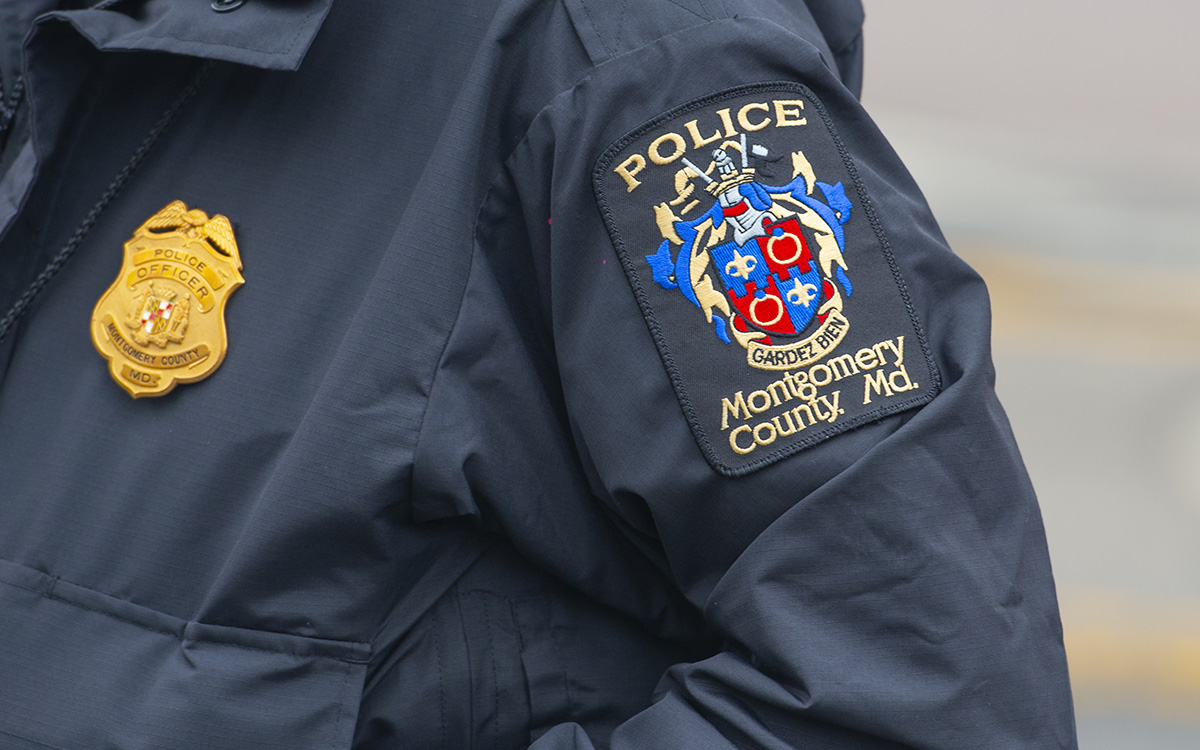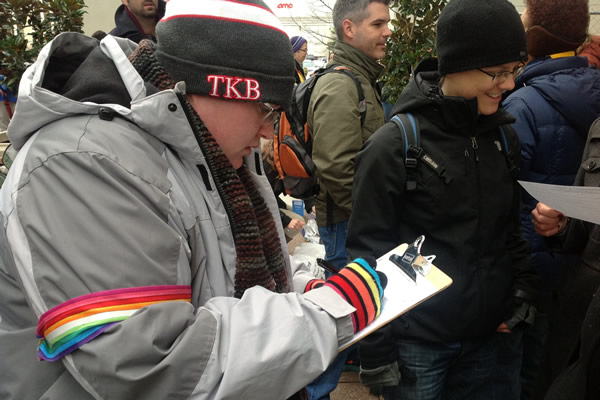Local
Same-sex couples seek Va. marriage licenses
Campaign for Southern Equality’s “We Do” campaign ended with march to D.C.


From left; D.C. residents Alyssa Weaver and Mike McVicker, who are from South Carolina, apply for a marriage license outside the Arlington County Courthouse on Jan. 17. (Washington Blade photo by Michael K. Lavers)
More than a dozen same-sex couples from across the South gathered outside the Arlington County Courthouse on Thursday to apply for marriage licenses.
Gays and lesbians from Alabama, Georgia, Mississippi, Tennessee and North and South Carolina submitted applications to Arlington Circuit Court Clerk Paul Ferguson in the complex’s plaza. A constitutional amendment that Virginia voters approved in 2006 defines marriage as between a man and a woman in the commonwealth, but those who participated in the action described their decision to take part as symbolic.
“We’re here to resist the unjust laws that label us as second class citizens and to call for full equality on the federal level,” Ivy Hill of Piedmont, S.C., told the Washington Blade after she filled out a marriage license in the complex plaza.
She and her partner of more than two years, Misha Gibson, recently became engaged.
“I’m here today to request a marriage license and knowingly being denied, but doing that to make sure that people know that we’re equal,” Gibson said. “I’m doing it to fight for my civil rights.”
Beth Schissel and Sally White of Atlanta joined four other same-sex couples who tried to apply for marriage licenses in Decatur, Ga., earlier this month.
White, who lived in Richmond for 30 years, joked with the Blade after Ferguson declined to issue them a marriage license she traveled to Virginia with her partner as a way to celebrate her birthday on Saturday.
“I’m a pediatric ER doctor,” Schissel said with tears in her eyes. “I take care of your children and take care of the sick and injured and I served my country. I went to the Air Force Academy and I served my country on active duty and yet I can’t have all the rights that are afforded me under that word marriage under federal law. So it’s a slap in the face type of feeling and it hits you deep in your core.”
The Arlington protest was the last in a series of actions organized by the Campaign for Southern Equality to highlight a lack of marriage rights for same-sex couples in the South and to urge the federal government to extend full equality to LGBT Americans.
The “We Do” campaign kicked-off in Hattiesburg, Miss., on Jan. 2 when five gay and lesbian couples applied for marriage licenses. Others followed suit in Mobile, Ala., Morristown, Tenn., Greenville, S.C., and three North Carolina cities before traveling to Virginia.
“We all live here in the South and we’re Southern folks,” Rev. Jasmine Beach-Ferrara, executive director of the Campaign for Southern Equality, who is also an ordained minister with the United Church of Christ in Asheville, N.C., told the Blade in an interview earlier this month. “This is where we live and we’re working with LGBT folks in small towns and cities across the region who are ready to stand up for equality — federal equality in new ways.”
She stressed her group’s approach to highlight the lack of marriage rights for same-sex couples below the Mason-Dixon Line reflects a broader strategy.
“We do feel like because this is the region where discriminatory laws are most deeply enshrined in state law, it creates a really powerful and unique opportunity to revisit those laws by using peaceful, direct action,” Beach-Ferrara said. “What we’re doing with the ‘We Do’ campaign is folks are taking action in their local communities to resist these state laws, to show what happens when they’re actually enforced. They’re typically invisible because they’re so rarely enforced, if at all. And so the general public is sort of insulated from the reality that we live with day in and day out as LGBT folks in the South, which is these laws exist, but when they’re actually enacted and enforced there’s an opportunity to talk about what that actually means and how that hurts real people and real families.”
Matt Griffin and Raymie Wolfe of Morristown, Tenn., who have been together for more than seven years, sought a marriage license in their hometown on Jan. 9.
Wolfe told the Blade before he and his partner tried to obtain a Virginia marriage license that they were “met with good humor” when they tried to do the same in Tennessee. He noted the clerk said it was the first time a gay couple had ever applied for a marriage license in the town — she did reaffirm the Tennessee does not recognize nuptials for gays and lesbians.
“What we wanted to do was kind of illustrate for people and ourselves what happens when we do that,” Wolfe said. “That’s kind of unprecedented. That was my hometown. It’s where I grew up and as a gay kid there, I kind never imagined that i would be going to a courthouse with a partner and applying for a marriage license.”
Same-sex couples gathered in Arlington three days after a Virginia House of Delegates subcommittee voted against a proposal that would have repealed the state’s constitutional ban on same-sex marriage.
Neighboring Maryland is among the nine states and D.C. that allow gays and lesbians to tie the knot. North Carolina voters last May approved a constitutional amendment that defined marriage as between a man and a woman by a 61-39 percent margin, while Minnesota voters on Election Day rejected a similar proposal.
The upcoming oral arguments before the U.S. Supreme Court in cases challenging the constitutionality of the Defense of Marriage Act and California’s Proposition 8 also weighed on the minds of the same-sex couples who applied for marriage licenses and those who witnessed them do so.
“I’m very sympathetic to what the people who came before me today are trying to do and I am happy that there’s other jurisdictions where they can go to have their marriage licenses processed,” Ferguson, who is a former member of the Arlington Board of Supervisors, told the Blade. “There’s a Supreme Court decision coming up and so that will add some clarity to a lot of these peoples’ marriages, which is what they were looking for.”
Tim Young and Mark Maxwell of Winston-Salem, N.C., legally married at the Jefferson Memorial after they and other same-sex couples who had sought Virginia marriage licenses marched from Arlington to the nation’s capital.
“We live our lives in a way where we are not denied anything and we are open to being prosperous and successful,” Young, who has been with Maxwell for 20 years and raised four boys with him, said. “We’ve educated ourselves. We run a business so we pay taxes in that state and we give our money to that state, but we don’t have the same rights as other people and we believe in equity and equality.”
Beach-Ferrara noted her group made a deliberate decision to end their latest campaign in D.C.
“It’s in a lot of ways a small, intimate group, but of folks who traveled on a journey that’s symbolic in a lot of ways in the sense that if you live in the South, you need to travel to Washington, D.C., before you can be recognized as an equal citizen,” she said. “The journey folks have taken sort of helps to illustrate the legal realities that LGBT folks live with, which is you are a second class citizen until you reach the Washington border.”
Maryland
Montgomery County police chief discusses arrest of trans student charged with planned school shooting
County executive tells news conference student’s trans identity is irrelevant to criminal charge

Montgomery County, Md., Police Chief Marcus Jones joined other county and law enforcement officials at a news conference on Friday, April 19, to provide details of the police investigation and arrest of an 18-year-old high school student charged two days earlier with threats of mass violence based on information that he allegedly planed a mass shooting at the high school and elementary school he attended in Rockville, Md.
In charging documents and in a press released issued on April 18, Montgomery County Police identified the arrested student as “Andrea Ye, of Rockville, whose preferred name is Alex Ye.”
One of the charging documents states that a friend of Ye, who police say came forward as a witness who played a crucial role in alerting authorities to Ye’s threats of a school shooting, noted that Ye told the witness that Ye identified as the transgender student he wrote about as a character in a 129-page manifesto outlining plans for a school shooting. Police have said Ye told them the manifesto was a fictional story he planned to publish.
At the news conference on Friday, Police Chief Jones and other law enforcement officials, including an FBI official and Montgomery County Executive Marc Elrich, referred to the student as Alex Ye and Mr. Ye. None of the officials raised the issue of whether Ye identified as a transgender man, seven though one of the police documents identifies Ye as a “biological female.”
County Executive Elrich appeared to express the views of the public officials at the news conference when one of the media reporters, during a question-and-answer period, asked Elrich why he and the others who spoke at the news conferment failed to “admit that this individual was transgender.”
“Because it’s not a lead,” Elrich replied, asking if the press and law enforcement authorities should disclose that someone arrested for murder is “a white Christian male who’s heterosexual.” Elrich stated, “No, you don’t – You never publish somebody’s sexual orientation when we talk about this. Why you are focusing on this being a transgender is beyond me. It’s not a news story. It is not a crime to be transgender.”
The reporter attempted to respond but was cut off by the press conference moderator, who called on someone else to ask the next question.
In his remarks at the press conference Chief Jones praised the so far unidentified witness who was the first to alert authorities about Ye’s manifesto appearing to make threats of a mass school shooting.
“Now, this is a situation that highlights the critical importance of vigilance and community involvement in preventing potential tragedies,” Jones said. “I commend the collaborative efforts of the Montgomery County Police Department, the Federal Bureau of Investigation, the Rockville City Police Department, and the Montgomery County Public Schools, as well as Montgomery County Health and Human Services,” he told the gathering.
“Thanks to their swift action and cooperation a potentially catastrophic event was prevented,” Jones said.
Jones pointed out that during the current school year, police have received reports of 140 threats to the public schools in Montgomery County. He said after a thorough investigation, none of them rose to the level where an arrest was made. Instead, police and school officials took steps to arrange for the student making the threats and their parents to take remedial action, including providing mental health services.
“But this case is different,” Jones said. “This case is entirely different that takes it to a different level. It was a concerned witness who brought this matter to light by rereporting the suspect’s manifesto to the authorities. This underscores the value of community engagement and the ‘see something say something’ approach,” he said.
Jones mentioned at the press conference that Ye was being held without bond since the time of his arrest but was scheduled to appear in court for a bond hearing on Friday shortly after the press conference took place to determine whether he should be released while awaiting trial or continue to be held.
In his manifesto obtained by police, Ye writes about committing a school shooting, and strategizes how to carry out the act. Ye also contemplates targeting an elementary school and says that he wants to be famous.
In charging documents reported on by WJLA 7 and WBAL 11, the 129-page document, which Ye has referred to as a book of fiction, included writings that said, in part:
“I want to shoot up a school. I’ve been preparing for months. The gun is an AR-15. This gun is going to change lives tomorrow … As I walk through the hallways, I cherry pick the classrooms that are the easiest targets. I need to figure out how to sneak the gun in. I have contemplated making bombs. The instructions to make them are surprisingly available online. I have also considered shooting up my former elementary school because little kids make easier targets. High school’s the best target; I’m the most familiar with the layout. I pace around my room like an evil mastermind. I’ve put so much effort into this. My ultimate goal would be to set the world record for the most amount of kills in a shooting. If I have time, I’ll try to decapitate my victims with a knife to turn the injuries into deaths.”
Maryland
Rockville teen charged with plotting school shooting after FBI finds ‘manifesto’
Alex Ye charged with threats of mass violence

BY BRETT BARROUQUERE | A Montgomery County high school student is charged with what police describe as plans to commit a school shooting.
Andrea Ye, 18, of Rockville, whose preferred name is Alex Ye, is charged with threats of mass violence. Montgomery County Police and the FBI arrested Ye Wednesday.
The rest of this article can be found on the Baltimore Banner’s website.
District of Columbia
New D.C. LGBTQ+ bar Crush set to open April 19
An ‘all-inclusive entertainment haven,’ with dance floor, roof deck

D.C.’s newest LGBTQ+ bar called Crush is scheduled to open for business at 4 p.m. on Friday, April 19, in a spacious, two-story building with a dance floor and roof deck at 2007 14th St., N.W. in one of the city’s bustling nightlife areas.
A statement released by co-owners Stephen Rutgers and Mark Rutstein earlier this year says the new bar will provide an atmosphere that blends “nostalgia with contemporary nightlife” in a building that was home to a popular music store and radio supply shop.
Rutgers said the opening comes one day after Crush received final approval of its liquor license that was transferred from the Owl Room, a bar that operated in the same building before closing Dec. 31 of last year. The official opening also comes three days after Crush hosted a pre-opening reception for family, friends, and community members on Tuesday, April 16.
Among those attending, Rutgers said, were officials with several prominent local LGBTQ organizations, including officials with the DC Center for the LGBTQ Community, which is located across the street from Crush in the city’s Reeves Center municipal building. Also attending were Japer Bowles, director of the Mayor’s Office of LGBTQ Affairs, and Salah Czapary, director of the Mayor’s Office of Nightlife and Culture.
Rutgers said Crush plans to hold a grand opening event in a few weeks after he, Rutstein and the bar’s employees become settled into their newly opened operations.
“Step into a venue where inclusivity isn’t just a promise but a vibrant reality,” a statement posted on the Crush website says. “Imagine an all-inclusive entertainment haven where diversity isn’t just celebrated, it’s embraced as the very heartbeat of our venue,” the statement says. “Welcome to a place where love knows no bounds, and the only color or preference that matters is the vibrant tapestry of humanity itself. Welcome to Crush.”
The website says Crush will be open Tuesdays and Wednesdays from 4 p.m. to 12 a.m., Thursdays from 4 p.m. to 2 a.m., Fridays from 4 p.m. to 3 a.m., Saturdays from 2 p.m. to 3 a.m., and Sundays from 2 p.m. to 12 a.m. It will be closed on Mondays.
Crush is located less than two blocks from the U Street Metro station.
-

 Africa5 days ago
Africa5 days agoCongolese lawmaker introduces anti-homosexuality bill
-

 District of Columbia2 days ago
District of Columbia2 days agoReenactment of first gay rights picket at White House draws interest of tourists
-

 World5 days ago
World5 days agoOut in the World: LGBTQ news from Europe and Asia
-

 District of Columbia1 day ago
District of Columbia1 day agoNew D.C. LGBTQ+ bar Crush set to open April 19










